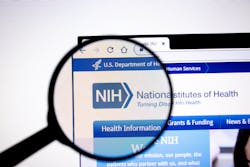The National Cancer Institute, part of the National Institutes of Health, will award $23 million to four academic institutions to establish centers of excellence that will conduct research on the role of telehealth in delivering cancer-related healthcare.
The research will study the role of telehealth in fields ranging from prevention to screening, diagnosis to treatment, and survivorship. Each center will be led by an academic institution that has assembled diverse teams of researchers to conduct large trials in real-world clinical settings such as hospitals, cancer centers, oncology practices, and primary care offices.
The four institutions are the NYU Grossman School of Medicine in New York, Northwestern University, the University of Pennsylvania in Philadelphia, and the Memorial Sloan Kettering Cancer Center in New York.
The awards will establish NCI’s Telehealth Research Centers of Excellence (TRACE) initiative, which is being supported by the Cancer Moonshot, a White House initiative first launched in 2016 and reignited by President Biden in 2022 to accelerate the rate of progress against cancer. The awards are to be distributed over five years, pending availability of funds.
“One of the Cancer Moonshot goals is to make the cancer experience less burdensome for patients and their families and caregivers,” said Katrina Goddard, Ph.D., director of NCI’s Division of Cancer Control and Population Sciences (DCCPS), in a statement. “We are awarding these centers of excellence to better understand how telehealth can contribute to improved health outcomes across the cancer care continuum.”
“These centers will address important gaps in telehealth and cancer-related care delivery,” said Robin C. Vanderpool, Dr.P.H., chief of the Health Communication and Informatics Research Branch in DCCPS, in a statement. “We need to establish an evidence base for using this technology to deliver health care in oncology and make it part of routine care. In addition, these centers will explore opportunities for scalability and dissemination of their cancer-related telehealth interventions beyond their own health systems.”
These are the four funded centers:
- The Telehealth Research and Innovation for Veterans with Cancer (THRIVE) Telehealth Research Center: Led by NYU Grossman School of Medicine, New York City, this center will work with the Veterans Health Administration to examine how social factors such as race and ethnicity, poverty, and rural residence affect the delivery of telehealth for cancer care.
- The Scalable Telehealth Cancer Care (STELLAR) Center: Led by Northwestern University, Evanston, Ill., this center will focus on using telehealth to extend health services to cancer survivors aimed at reducing risk behaviors such as smoking and physical inactivity.
- The University of Pennsylvania Telehealth Research Center of Excellence (Penn TRACE): Led by the University of Pennsylvania, Philadelphia, this center will use communication science and behavioral economics to compare the effectiveness of multiple telehealth strategies on shared decision-making for lung cancer screening and to improve timely access to comprehensive molecular testing for advanced lung cancer.
- The Making Telehealth Delivery of Cancer Care at Home Effective and Safe (MATCHES) Telehealth Research Center: Led by Memorial Sloan Kettering Cancer Center (MSK), New York City, this center will study the effectiveness of a remote monitoring system called MSK@Home for patients receiving systemic treatments for prostate and breast cancer.
In addition to developing innovative ways to use telehealth in cancer care, the centers will focus on identifying and addressing telehealth-related disparities among vulnerable populations, including racial and ethnic groups, rural residents, older adults, people who are uninsured or low-income, people who are socially isolated, and people who have limited digital literacy. All four centers are also committed to training the next generation of telehealth-focused researchers.
“For patients undergoing screening or treatment for cancer, advances in telehealth propelled by the COVID-19 pandemic could be tremendously beneficial, yet telehealth strategies must address the digital divide so as not to also exacerbate known disparities in cancer outcomes,” said Katharine Rendle, Ph.D., an assistant professor of Family Medicine and Community Health and deputy director at the Penn Center for Cancer Care Innovation (PC3I), in a statement. “We aim not only to ensure equal access to telehealth but also to use it in ways that reduce persistent barriers to care in order to transform how we deliver cancer care today.”


